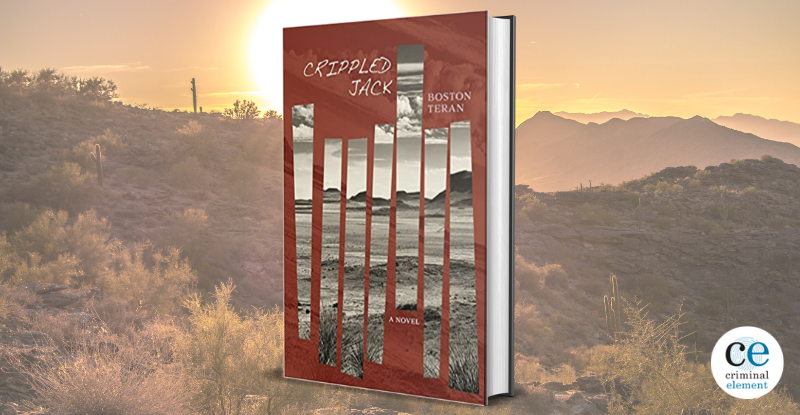Book Review: Crippled Jack by Boston Teran
By Doreen Sheridan
September 26, 2022
This novel is billed as a revisionist Western, and it’s certainly a far cry from the typical romance of lone gunmen fighting off savage bandits to the swooning gratitude of defenseless frontier towns. But as historical fiction, it’s not at all far off from the reality of the Western United States during the turn of the 20th century, when the titans of industry amassed great wealth at the expense of workers, leading to efforts at unionization famously spearheaded by Mary “Mother” Jones.
Mother Jones herself plays a prominent part in this narrative, as her story intertwines with that of our hero, Matthew. Bound and gagged and left to die in the desert by his desperate parents, Matthew is found by the fugitive Ledru Drum, also known as the Coffin Maker. Ledru shows him an uncommon kindness, so when the Pinkertons on Ledru’s trail enact their brutal reckoning, the orphaned Matthew swears his vengeance.
Taking to heart the lessons Ledru taught him, Matthew eventually turns into a renowned sharpshooter on the competitive circuit, with the titular moniker given to him by some marketing-minded wise-guy. The name is both an advertisement (come see the man with disabilities who can shoot just as well if not better than anyone else! ) and, as Matthew understands all too well, a reminder for him to remember his place in the social order:
Matthew knew there was something else hidden behind the name, lurking there in all its worldly matter, just as one mountain may hide another, one building may hide another, one shadow may hide another. This was a way of reminding him he was lame. Of diminishing his achievement and rubbing his face in his physical infirmity. Though he could win a shooting competition, he would still go home as a cripple and be what he sees in a mirror. That even if you are dripping with insight, you can never walk taller, no matter how tall you walk.
When Matthew’s quest for revenge brings him to Colorado, he becomes unwittingly but not at all unhappily embroiled in the work of Mother Jones and her Federation of unionizing workers. Mining conditions at the (fictional) Americanus are unbearable, and Mother Jones is ready to let the whole world know about it.
Covering all this is reporter Nola Dye, the adopted daughter of newspaper owners whose own past as an orphan is never far from her mind. Nola is sympathetic both to the strikers and to Matthew, though her ethical sensibilities lead her to warn him against confiding in her too intimately. For there is a new Coffin Maker hunting down Pinkertons in the Wild West, and while Nola suspects she knows his true identity, she does not want to feel morally obligated to expose it to all the world.
Nola’s own quest for the truth and justice will bring her from refined private audiences with the richest of silver magnates to the dirty, claustrophobic bowels of Colorado’s mines, as she gives each side in the burgeoning capital-labor conflict a chance to have their say. Nathan Neihart, the owner of the Americanus, is charming and anti-union, asking Nola who will watch over the unions should they manage to wrest power from the owners and become as deeply warped as the people they themselves accuse of corruption. It’s Mother Jones who has the best answer to that, telling Nola as they’re conversing one night in the former’s tent, set up in the middle of a field of encampments of the poor:
“The only way to stop them is with people like you…and people like me.” She swept open the canvas [door] to the night. “And people like those poor bastards around all those fires. Because if the union gains power and goes corrupt, there will always be a generation of newly poor, newly disenfranchised, and newly exploited to fight them.”
She let the canvas drop away.
“Miss Dye, I hope you didn’t actually think the fight can be won for all time. Only youth believes such nonsense exists. Life is much more egregious and demands relentless dedication. And understands that failure and defeat are as essential to success as goodwill and honesty.”
Boston Teran re-envisions the Western as a pro-union, anti-exploitation screed that shines a light on the excesses and corruption of the capital class before pointedly drawing parallels between those themes and their present day, ongoing equivalents. Everything old is new again, as they say, whether it be in the exploitation of the poor or in the use of prison labor that’s merely a modern form of slavery, as the chapters set in Sugarland so harrowingly remind us. While the language used is hardly politically correct, it is reckoned with in a way that acknowledges the wrongs of the past and how they continue into our current reality, and what we as a society need to do to work at building systems that work towards justice and fairness.
Comments are closed.

Thank you for the opportunity to comment. Everyone needs the opportunity to speak out and express their opinion. And it needs to be done on an ongoing basis. Ideally, of course, talk with a specialist, but someone is not yet ready for this.
Crippled Jack by Boston Teran is a gripping novel that follows a young boy named Jack as he navigates the brutal world of 1920s Southern California. After his family is murdered, Jack is forced to survive on his own and becomes involved with a dangerous gang. The novel is a visceral exploration of violence, redemption, and the human spirit, and is praised for its vivid characters and cinematic storytelling.